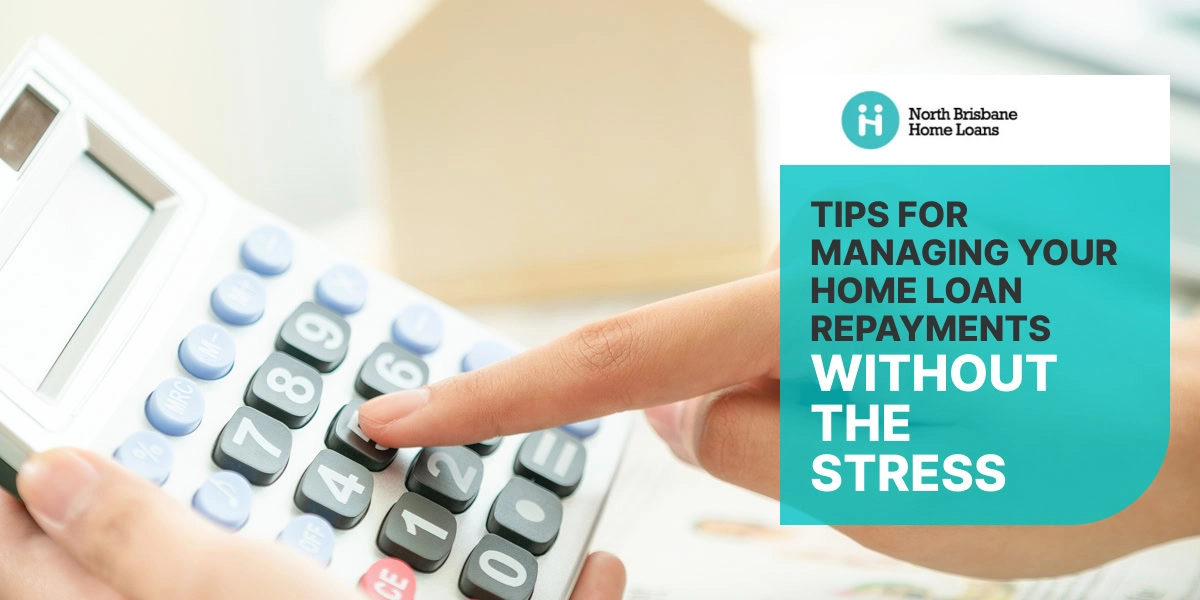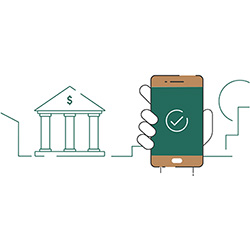
Are you a self-employed individual in Brisbane seeking a home loan? If you are, then this guide to self employed home loans in Brisbane should be helpful. Navigating the property market and securing a mortgage can be a unique challenge when you’re managing your own business. This journey, while exciting, often requires a different approach due to the distinct financial profiles of self-employed individuals.
Our team of expert mortgage brokers specialises in understanding and catering to these unique needs. We’re here to provide personalised advice and solutions, ensuring you find a home loan that fits your self-employed status. Let us help you make your property owning dreams a reality with confidence and ease!
Self Employed Home Loans – How To Get A Mortgage
10 Reasons Why You Should Work With A Mortgage Broker For Self-Employed Home Loans
Securing a home loan can be a complex process, especially for self-employed individuals with unique financial situations. This is where the role of a mortgage broker becomes crucial.
Opting for a mortgage broker who is experienced in handling self employed home loans offers significant benefits. They provide professional guidance and customised solutions, ensuring that the specific requirements of self-employed borrowers are efficiently addressed.
Below are 10 key reasons why choosing a mortgage broker for your self employed home loan is a wise and beneficial decision.

- Expertise in Self-Employed Loans
- Time-Saving
- Access to a Wider Range of Lenders
- Professional Advocacy
- Customised Loan Solutions
- Guidance on Financial Documentation
- Simplified Application Process
- Ongoing Support
- Better Rates and Terms
- No Cost to the Borrower
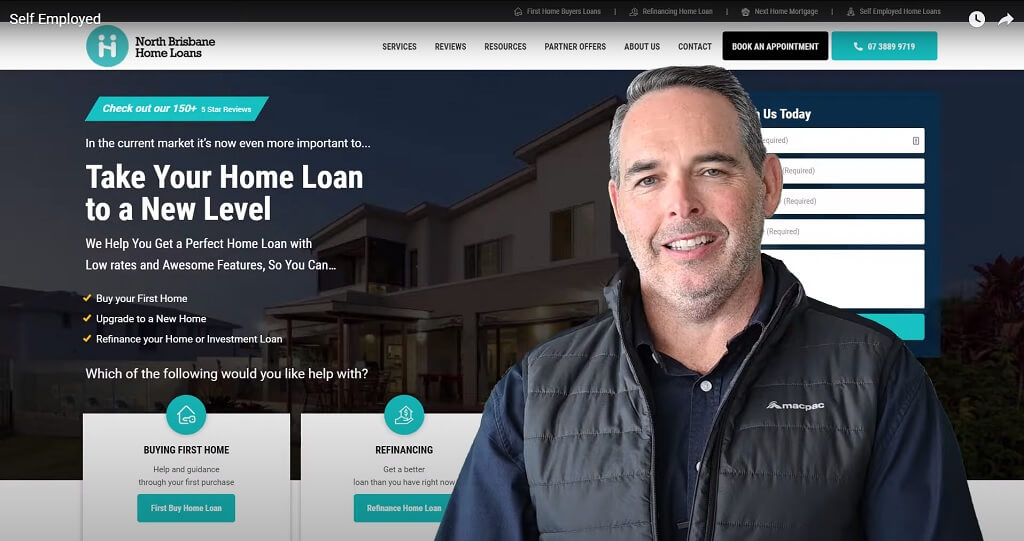
Self Employed Home Loans – Additional Helpful Information
Self-employed individuals often face unique challenges when applying for home loans. Unlike traditional salaried employees, whose income is verified through regular payslips, self-employed borrowers must provide more complex financial documentation.
But with the right preparation and understanding of the process, securing a self-employed home loan can be straightforward. Here are a few more things you might want to know when you’re thinking about getting a home loan as a self-employed borrower.
Understanding the Types of Loans Available
When applying for a home loan, self-employed individuals generally have two main options – Full Doc loans and Low Doc loans. Each loan type has its own eligibility criteria and benefits.
- Full Doc Loans – These are traditional home loans that require complete financial documentation, including personal and business tax returns from the past two years, bank statements and a notice of tax assessment from the ATO.
If you have all the required documentation, a Full Doc loan usually offers the lowest interest rates, making it a preferred option for those who can provide comprehensive financial information.
- Low Doc Loans – If you lack some of the financial documentation required for a Full Doc loan, you may qualify for a Low Doc loan. Low Doc loans require less paperwork, such as business activity statements (BAS) or an accountant’s letter, but often come with higher interest rates.
These loans can be a great option for self-employed borrowers who have less than two years of tax returns.
Both loan types allow self-employed individuals to access the same loan features as traditional borrowers. These include fixed and variable-rate loans, offset accounts and lines of credit. However, it’s important to weigh the benefits of a quicker Low Doc application process against the potential costs of higher interest rates.
Key Eligibility Criteria for Self-Employed Home Loans
Self-employed borrowers must meet several eligibility requirements. These are generally stricter than those for salaried employees. Here’s a breakdown of what lenders typically look for:
- Business and Personal Tax Returns – Most lenders require at least two years of tax returns to establish a stable income history. They may use the lower of the two years’ income to calculate your borrowing power or an average of the two years.
- Proof of Income – Aside from tax returns, lenders may ask for bank statements showing consistent cash flow, business activity statements and profit-and-loss statements.
- Good Credit Score – A healthy credit score is crucial for self-employed borrowers. This demonstrates your ability to manage debt and repayments. Improving your credit score by paying off existing debts (such as credit cards or personal loans) before applying for a mortgage can help you secure better terms.
- Business Stability – Lenders want to see that your business is stable and profitable. Generally, the longer you’ve been self-employed, the more comfortable lenders will be. Some lenders may also consider whether your business has been registered for GST (typically required for businesses earning more than $75,000 annually) and how consistently you’ve earned income over time.

How to Maximise Your Borrowing Power
Self employed borrowers often face challenges in maximising their borrowing power due to fluctuating incomes. However, there are several strategies you can implement to improve your chances of securing a larger loan:
1. Consistent Income – Lenders prioritise stability, so maintaining a steady income over the past few years can work in your favour. Avoid large dips in revenue, which can reduce your borrowing power.
2. Pay Off Existing Debts – Reducing outstanding debts, such as credit card balances or personal loans, can improve your credit s core and show lenders that you are financially responsible. This can increase your chances of qualifying for a higher loan amount.
3. Improve Your Financial Documentation – Ensure that your tax returns, bank statements and other financial documents are up-to-date and accurately reflect your income and business performance. This will give lenders a clear picture of your ability to repay the loan.
Common Challenges for Self Employed Borrowers
Self-employed individuals face unique challenges when applying for a home loan, but understanding these hurdles can help you prepare effectively –
- Fluctuating Income – Many self-employed individuals experience fluctuations in their income from year to year. This can make it difficult for lenders to assess your ability to repay a loan. Some lenders may use the average of your income over the past two years, while others may take the lower figure, which can reduce your borrowing power.
- Stricter Lending Criteria – Lenders often perceive self-employed borrowers as riskier than traditional salaried employees. As a result, they may require a larger deposit (often at least 20%) and offer a lower loan-to-value ratio (LVR) than they would for regular employees.
- Limited Lender Options – Not all lenders offer loans to self-employed borrowers and those that do may charge higher interest rates. It’s important to shop around and compare different lenders to find one that offers favourable terms.
Documentation Requirements for Self-Employed Borrowers
The documentation required for self-employed home loan applications is more comprehensive than for salaried employees. Lenders typically ask for –
- Business and Personal Tax Returns – At least two years of tax returns to verify your income.
- Bank Statements – Business and personal bank statements showing consistent cash flow.
- Business Activity Statements (BAS) – BAS are used to demonstrate your business’s revenue over a specified period.
- Profit-and-Loss Statements – These show your business’s overall performance and profitability.
For Low Doc loans, the documentation requirements are less stringent. You may only need an accountant’s letter, proof of your ABN and GST registration and interim financial statements.
Benefits of Working with a Mortgage Broker
Navigating the home loan process as a self-employed borrower can be complex, which is why working with an experienced mortgage broker can be beneficial. A mortgage broker can –
- Help you gather the necessary documentation and ensure your financials are in order.
- Recommend the most suitable lenders for your unique situation, potentially saving you time and money.
- Negotiate on your behalf to secure a loan with the best possible interest rates and terms.
While getting a home loan as a self-employed individual can be more complicated, it is by no means impossible. With proper preparation, the right documentation and guidance from a knowledgeable mortgage broker, you can secure a loan that meets your needs. Whether you choose a Full Doc loan for its lower interest rates or a Low Doc loan for a faster application process, it’s important to understand your options and tailor your approach based on your financial situation.
7 Tips for Self Employed Home Buyers in Brisbane
Navigating the home loan process as a self-employed individual in Brisbane, Australia, requires careful planning and strategic thinking. To enhance your chances of securing the best possible home loan, consider these seven essential tips tailored for applicants of self employed home loans.
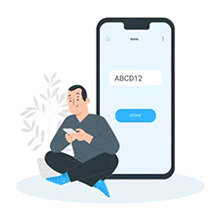
Prioritise Timely Bill Payments
Consistently paying your bills on time is crucial. Late payments on bills, credit cards, or loans can significantly impact your home loan eligibility. Conversely, a track record of punctual payments demonstrates to lenders your reliability and commitment to financial responsibilities.

Organise Your Financial Documentation
A common hurdle in the home loan application process is disorganised or incomplete financial records. Ensure your tax returns for the past two years are complete (including both business and personal) and organise your financial documents for easy access and clarity.

Simplify Your Financial Affairs
Lenders generally favour straightforward financial situations. Complex tax strategies or intricate lease arrangements might complicate your home loan application. Aim to simplify these aspects as much as possible for easier understanding by brokers and lenders.

Conduct a Thorough Credit Check
A credit check is a vital step in the mortgage application process. Obtain a recent credit report (you’re entitled to one free report every 12 months) and review it meticulously with your mortgage broker to identify any issues or inaccuracies.

Consult an Experienced Mortgage Broker
Engaging with a mortgage broker experienced in self-employed loans can significantly ease the application process. They offer tailored advice and practical suggestions, improving your chances of securing a suitable home loan. The earlier you consult a broker, the smoother the process will be.

Be Receptive to Your Broker’s Advice
Your mortgage broker’s recommendations, based on a thorough review of your finances, are invaluable. Be open to their suggestions, even if they differ from your initial thoughts. Their experience in securing favourable outcomes is a vital asset in your home loan journey.

Assess the Timing of Your Application
Discussing your situation with a self-employed mortgage broker might reveal that delaying your application could be advantageous. If your business is new or cash flow is tight, waiting a few months could lead to better loan terms, such as lower interest rates or a more suitable mortgage product.
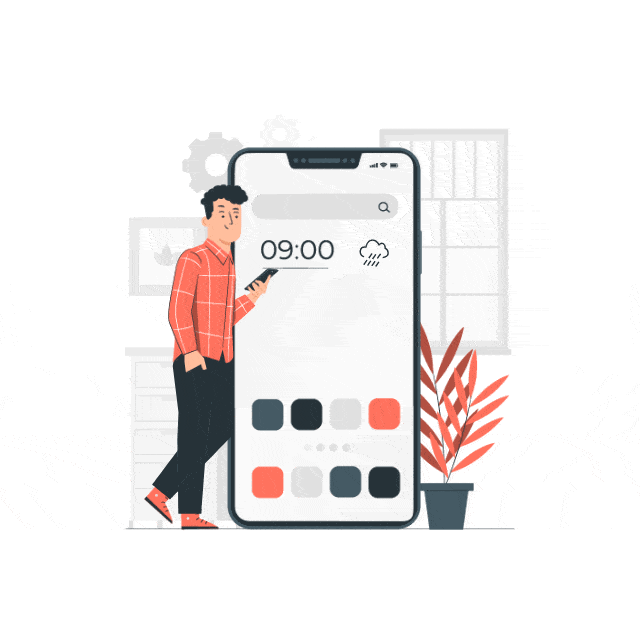
Maintain a Healthy Debt-to-Income Ratio
For self-employed individuals, maintaining a balanced debt-to-income ratio is key. This ratio is a critical factor lenders consider when assessing loan applications. Keeping your debts low relative to your income demonstrates financial stability and increases your attractiveness as a borrower.
NBHL: Best mortgage brokers for first time buyers
Home loans lenders often require additional paperwork if you’re self-employed, and you may need a larger deposit to secure finance. Let the professional mortgage brokers at North Brisbane Home Loans help you find a self employed home loan to suit your needs.
Why Choose North Brisbane Home Loans?

5 Star Customer Rating
We put you first and genuinely want to help you achieve your property ownership dreams.
Being a top rated first home buyers mortgage broker in Brisbane we delivered the best home loan for first home buyers. We have hundreds of happy customers, find out what they’ve said about working with North Brisbane Home Loans here.

Experienced Mortgage Brokers
With more than 90 years’ combined experience in the industry, our first home buyer mortgage broker can confidently offer you the best advice when it comes to finding the best value loan for you.
We are a team of experienced mortgage brokers in Brisbane that helps to get the best home loan for first home buyers.

We Work For You – Not The Banks
We don’t charge any fees for our first home owner loan services, our commission comes from the lender.
As a personal first home buyers mortgage broker in Brisbane, we’re by your side every step of the way to ensure you select the best first time home buyer loan product for your individual circumstances.

Exclusive Partner Network
Not only do we provide you with the best advice on first home owners loan needs, but we also introduce clients to our network of trusted partners offering discounted rates.
Save time and money searching for reliable building and pest, real estate agents, solicitors and more.
5.0 STAR REVIEWS
Reviews from First Home Buyers Brisbane, QLD

A*
I highly recommend Pat and his team to anyone looking for finance.
was exactly as discussed with no surprises. I will continue to use their services, it's a great family and local business.
We have bought a number of properties over the years. Pat and and the team make everything so easy for us. Pat’s knowledge and expertise has saved us so much money over the years, and we will continue to go back to NBHL time after time.
Pat and the team have a truly spectacular and streamline business. Their secure platform, digital systems and informative communications & instruction helped us broker a competitive loan and secure a property. With how busy life can get, having North Brisbane Home Loans provide their services has been an absolute stress saver!
I have been doing business with NBHL for quite some time as Patrick is an exceptional Mortgage Broker! He is professional, very knowledgeable, and quick to respond to any questions I had regarding my home loan, he consistently exceeds my expectations. I highly recommend Patrick and his team to anyone applying for a home loan or just wanting to refinance.
Bogdan & Eleanor
I recently had the pleasure of working with Patrick again after 3 years for our refinance, and I couldn’t be happier with the experience. Patrick, Jake and the whole team were extremely knowledgeable, professional, and patient as we navigated the whole process. They took the time to understand our needs and preferences, and found us the best suited option. The use of their portals to upload information and documents is a game changer! I would also like to mention the articles in the monthly newsletters are quite in depth and have been incredibly insightful. I have highly recommend Patrick and NBHL to friends, family and colleagues. See you next time! Cheers!
They went above and beyond to help us get our loan at the best deal and worked around the clock for us
Cannot thank then enough!
Any issues you come across, they will know how to handle it.
Would definitely recommend to friends and family.
We are very happy with our experience and would recommend others to use NBHL when looking for a fast and easy borrowing experience.
Their professionalism and communication with us were of the highest order. I would highly recommend Pat to anyone looking for a homeloan!!
Have now used NBHL for re-financing our home loan and to purchase our investment property. Can highly recommend.
You consistently ensured that we understood each step of the home loan process. Your ability to explain complex financial terms in a simplified manner made us feel confident and empowered in making informed decisions.
Moreover, your expertise in utilising technology to streamline the loan application process was truly remarkable. From secure online document submission to virtual meetings, you effortlessly incorporated modern tools into our interactions. This not only saved time but also demonstrated your commitment to staying at the forefront of industry trends, ensuring a smooth and efficient experience.
Once again, thank you for everything you have done. I wish you continued success in your endeavours, and may your expertise positively impact many more individuals like myself.
Well done Team North Brisbane Home Loans!!
They kept me informed at every stage of the process from the solution hunting, to the decision making and throughout the closing process.
Their services were invaluable and I couldn’t recommend them highly enough.
Pat, Di and the team at North Brisbane Home Loans are so lovely and took away a lot of the stress of the whole process by communicating regularly and by explaining in detail all answers to any questions we had. They guided us through every step of the way and now thanks to the team we are in our dream home.
Thank you all so much, we are over the moon!
10/10 recommend!
They were extremely responsive throughout the entire process with consistent and reliable communication.
Would recommend to anyone looking to get into the market with a knowledgeable Broker!
Thankyou.
Thanks to the team at NBHL for everything.
We used Pat and his team when we originally bought our first home back in 2017, and they were so fabulous that we went back to them this year (2022) to re-mortgage and change up our home loan. They do a wonderful job - great communication and dedication to get you the best rates possible. They also fix any mistakes the bank makes for you, quickly and efficiently. Can't rate them high enough, we will definitely be going back to them in the future.
Back in 2021 a colleague referred me to Patrick, we weren’t ready to buy yet but wanted to meet Pat as he had helped my colleague with his family home, plus 2 additional investment properties. My colleague was so impressed by the services offered by Pat that I had to meet him for myself! He didn’t disappointment, we decided after our first meeting on a plan and locked in to touch base again in a years time!
1 year later, everything was in place and Pat helped us put everything in place and we are now proudly living in our new family home!
Many healthily conversations were had, and Pat is really knowledgeable but we also appreciate his cool and calm manner.
We will not hesitate to refer him and North Shore Home Loans to friends and family. We will also definitely be reaching out again when we expand our investment portfolio in the future.
We had a very pleasant experience with Luke he took the time to investigate several different scenarios to get us the best possible product and solution. Luke and Fiona were very responsive to our queries even calling after hours when necessary. While we were first time home buyers they reassured us every step of the way, confident in their advice and decision. Their patience and willingness to walk us step by step each process over the phone was greatly appreciated.
Overall a very efficient and professional organisation you won’t be disappointed.
Frequently Asked Questions About Self Employed Home Loans
Will I have more trouble getting a home loan if I’m self employed?
It certainly used to be more difficult for a self employed person to get a home loan, but thankfully, this no longer has to be the case. Being self employed has become increasingly common in Australia, with 2.1 million registered business owners and 1.2 million sole traders. As a result, more lenders are coming to appreciate the unique situation that self employed borrowers find themselves in. The key difference in applying for a self employed home loan these days is that you’ll be asked to present your tax returns as proof of income, rather than paperwork from an employer. To give yourself the greatest chance of success it’s a good idea to team up with a broker who has experience in submitting self employed mortgage applications.
Is there a minimum amount of time I need to have been self employed before I can apply for a mortgage?
Most lenders prefer for a self employed borrower to have been in the same situation for at least two years (as this means they can provide two full years’ worth of tax returns). However, some lenders will consider applications from individuals who have been self employed for less than two years. These lenders specialise in helping shorter term self employed clients, however the deposit amount required is normally higher as is the interest rate.
I’ve only been self employed for one year – is it worth applying for a home loan?
If you’ve been self employed for less than two years then contact one of our brokers to find out what options could be available to you. Some lenders may assess your eligibility based on how long you’ve been working in a particular industry as opposed to solely how long you’ve been self employed. For example, if you worked as a mechanic for six years as an employee and you’ve now been working as a self employed mechanic for over a year, that may increase your eligibility in the eyes of some lenders. Other lenders may consider applications that come with a deposit of at least 20% of the property price. But individual circumstances will vary and the best course of action is to speak directly with a mortgage broker.
How will my income be assessed for a self employed home loan?
Most lenders will want to see your tax returns for the past few years, rather than proof of a weekly or monthly income. This is good news for self employed borrowers who may experience a more erratic income schedule. In some situations, a lender may also ask for BAS statements or bank statements.
What is a Low Doc loan?
Low Doc loans are a specific type of mortgage product designed for borrowers who don’t have a lot of the traditional supporting documentation typically requested by lenders. They first appeared on the mortgage market in the late 1990s and were offered by non-bank lenders to people who would struggle to qualify for a home loan based on the standard lending criteria. Low Doc loans gradually became more of a mainstream product, and today they are available from most of the big lenders, including the major banks. Low Doc loans can be a great solution for self employed borrowers, but they may also come with higher interest rates or require a larger deposit.
What are the most common application issues with self employed home loans?
Self employed home loan applications can encounter a range of issues, but the most commonly encountered ones include:
1. A successful business with a clever accountant (where your business is performing better than it appears on paper).
2. Applicants who have been self employed for less than two years continuously.
3. Rapid expansion of the business (resulting in raised eyebrows and a lot of questions from the bank).
4. Banks basing their assessment off the lowest figure shown in your tax returns, not the most recent.
If any of these situations apply to your business then don’t give up hope – many of these issues may be overcome by working with an experienced broker.
What should I know about add-backs?
As part of the overall assessment of your self employed mortgage application, a lender will take into consideration any unusual expenditures that don’t make up a regular part of your business expenses. This could include the interest you’ve paid on a business loan, depreciation on assets, company vehicle expenses or even additional contributions you’ve made towards your superannuation. Why are add-backs important? Because some lenders will ‘add-back’ the sum of these expenses to get a more accurate idea of your income – but others won’t. Correctly identifying and presenting add-backs can play an important role in determining whether or not a self employed mortgage application is approved.
My cash flow is a bit irregular – will this be an issue?
Don’t worry too much about irregular cash flow. Most lenders now appreciate the fact that when you’re self employed you’ll typically go through a cash flow cycle of feast and famine. This is why it’s important to have your tax returns in order – so that lenders can assess your annual income rather than a weekly or monthly income. But if you have experienced any major fluctuations in income then it helps if you have a reasonable explanation of why.
What else should I know about applying for a self employed home loan?
Applying for a self employed home loan doesn’t have to be stressful. It doesn’t have to be complicated. And it doesn’t mean you have to settle for higher fees and less competitive rates. Start by talking to a mortgage broker who has plenty of experience in working with people who are self employed. They can work with you throughout the entire process to ensure that you achieve the best possible result for your particular circumstances.
Book A Free Self Employed Home Loan Consultation
To book a free Self Employed Loan consultation, or for expert mortgage broker advice to help you buy your first home, contact the team at North Brisbane Home Loans.
New Updates
Latest Posts


